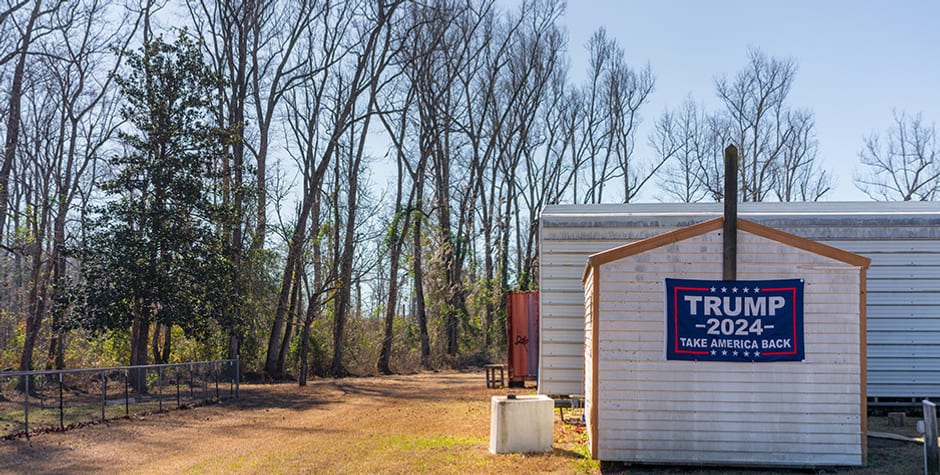ACLJ Wins Legal Victory on Behalf of Family Ordered by Police Not To Display Trump Sign
Listen tothis article
The ACLJ has defended your right to vote all the way to the United States Supreme Court, where we recently won a unanimous victory for your right to vote for the candidate of your choice against the Trump ballot ban. Now the ACLJ has successfully taken action against a local ordinance that prohibits citizens from displaying political signs until mere weeks before an election – an egregious violation of their right to free speech.
A local ordinance in the village of Carrollton, Ohio, reads: “Political signs may be exhibited not more than thirty days before nor more than seven days after the date of any election.” This ordinance applies to all kinds of buildings, even to personal residences; it effectively bans political signs in yards all year round except for only a narrow window of time in the few days surrounding an election.
An ordinance like this has many constitutional problems. One of them is that in Ohio, early voting commences on October 8, 2024, and many people plan to vote on days other than Election Day itself. This ordinance will, therefore, ban political signs until almost immediately before the election actually starts. People have been discussing political topics for many months before the election, but this ordinance still bans people from communicating their views. The Supreme Court has emphasized that political signs placed in residential yards or in windows have long been an “important and distinct medium of expression.” Removing that right is nothing short of a blatant attempt to silence political speech and manipulate the democratic process.
Our clients are homeowners in Carrollton, where this ordinance applies. Like many citizens of Carrollton, they wish to show their support for their preferred candidate for President by placing political signs in their yard. This support is not limited to simply 30 days before an election; they have a fundamental desire to express their political support throughout the year.
Accordingly, they placed a sign in their yard showing their support for President Trump. In previous years, they had similar signs without incident. But on August 27, 2024, a Carrollton police officer arrived at their door. He told them that he had been directed to go door to door to families that had political signs in their yards and order them to remove the signs. This order was so egregious that our clients thought it was a joke, but the officer confirmed the order; they had to take down their sign.
The law is clear. In Reed v. Town of Gilbert, 576 U.S. 155, 155 (2015), the Supreme Court held that provisions in a town’s sign code, which imposed more stringent restrictions on signs directing the public to a meeting of a nonprofit group than it did on signs conveying other messages, were an impermissible content-based regulations of speech. The Court made clear that content-based laws that distinguished between signs based on their message for unequal treatment “are presumptively unconstitutional and may be justified only if the government proves that they are narrowly tailored to serve compelling state interests.” That important case stands for the basic principle that the government cannot create sign laws that discriminate based on the content of the sign.
This case is in Ohio, and the Ohio Supreme Court has ruled that an ordinance almost identical to this one, banning political signs until shortly before an election, is unconstitutional. That Court has emphasized that such an ordinance “could easily operate to prohibit the display of a political message at the very time it would be most relevant to an issue upon which the citizen wishes to speak.” The Sixth Circuit Court of Appeals has done the same thing, striking down an ordinance that imposed size and duration limits on political signs, explaining that a town offered “no rationale for why political signs, as opposed to signs advertising local businesses, mar the city’s aesthetic appeal in such a way as to merit an arbitrarily smaller size restriction.”
We sent a letter on Tuesday to Carrollton, demanding that it immediately cease from applying this unconstitutional ordinance. Prohibiting political signs until only a month before an election day is blatantly unconstitutional. Whenever the government limits private speech on private property, it bears a heavy burden to seek to justify its conduct. That burden becomes an insurmountable one where, as here, the government discriminates based on the content of people’s speech.
A day after receiving our demand letter, the town of Carrollton responded and agreed to stop enforcing this unconstitutional ordinance and to stop preventing our clients from placing political signs in their yard. This represents a triumph for this family and others affected by this unconstitutional ordinance. The town also agreed to take the ordinance to the Village Council for discussion and direction to take action, which should lead to the ordinance being removed from the books entirely. But regardless, our clients and others will be able to immediately resume their right to political advocacy and to participate in the 2024 election. Support us in these fights.
